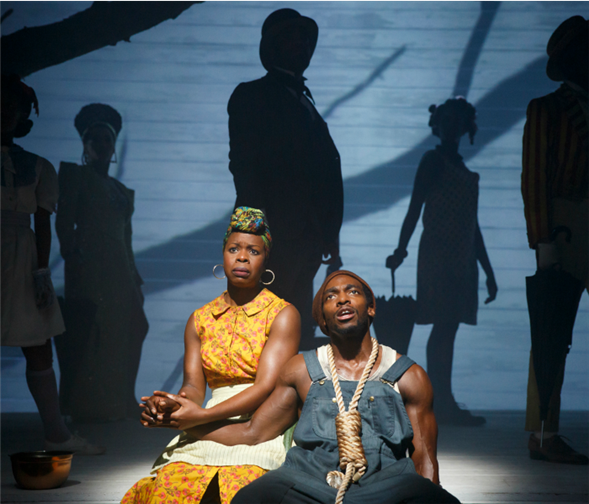Translate Page

Why politically charged theatre is more important than ever
---
Since the presidential election, a war cry has gone up among many in the theatre community to radicalize the stage, to imagine dramatic extensions and expressions of "the resistance" akin to those created by Bertolt Brecht in Germany, Dario Fo in Italy, and Athol Fugard in South Africa. On the home front, we certainly have our own agitative artists: Amiri Baraka, Bread and Puppet Theater, and Arthur Miller come to mind. Their approaches could hardly be more different, which just goes to show that there are many ways to share a message -- though the message may not always be clearly heard.And misinterpretations can be so painful. I remember attending a revival of Twilight of the Golds years ago at a community theatre upstate. Jonathan Tolin's chamber drama is set in a near future when a baby's sexual orientation can be predicted in utero. The central conflict is whether an expectant mother, who learns that her son is destined to be gay, will terminate her pregnancy or not. I found the play deeply distressing; a couple I met at a dinner afterward decidedly did not. The husband in particular thought the choice was obvious: abort. Why all the fuss? He soon knew I was gay, but what did that matter? Why was I upset? It's just a play. Or so he said. Frankly, I couldn't believe we had seen the same show!
This is not my roundabout way of suggesting that political theatre is pointless. Quite the contrary: it's crucial, especially these days. Because while a production might not overhaul our way of thinking or our politics, it can trigger a reawakening that may spur us to action. In a world in which terms like "post-truth" and "fake news" are bandied about, that's no small thing. Theatre can help us step outside the spin and ground us in shared truths.
I'm not the first to liken theatregoing to a secular form of churchgoing. Parishioners attend services for lots of the same reasons many of us go to shows: community, connection, enlightenment if we're lucky. And what's wrong with preaching to the converted? Can you imagine a worshiper of any faith kvetching that the one at the pulpit knew the congregation too well? Like a good sermon, a politically informed production may just shake us out of passivity and inspire us to action. As Arthur Miller put it in his translation of Ibsen's An Enemy of the People: "Rights are sacred until it hurts for somebody to use them." Should you be feeling the pain in this rife political climate, a show that reflects and examines your fears and frustrations will remind you that you're not in this alone.
When I first saw The Normal Heart decades ago at a small black box in Baltimore, I didn't cry upon hearing the litany of damning stats -- horrifying as they were. I was an Act Up member who was all too aware of the criminal neglect of our government in regard to AIDS. What moved me was the devotion manifested in that play's central couple: two gay men struggling to make it work -- and save lives -- in a culture indifferent to their very existence. It was a reminder that striving for equality, justice, and liberty is rooted in love for each other, and the hope for a better future for those close to us as well as humanity at large.
Signature Theatre's choice to dedicate its current season to provocateur Suzan-Lori Parks -- a playwright who's never shied away from truth telling -- was prescient. The opening production, The Death of the Last Black Man in the Whole Entire World, felt like a call to arms in a highly unconventional way. Amid all her verbal pyrotechnics, the playwright is fully aware that change can only be made once we have fully owned the past. Sometimes the greatest form of resistance may simply be to step forward and insist on being heard.
Last Black Man was just one of many politically aware productions on the boards this past fall. Richard Nelson's The Gabriels trilogy at the Public Theater, Ivo van Hove's epic Kings of War at BAM; three concurrent interpretations of Brecht's fascist satire Arturo Ui, even the Broadway production of The Cherry Orchard felt like a savvy critique of white privilege. What lies ahead? I haven't a clue. Is there a new Lorraine Hansberry or Tony Kushner waiting in the wings? What might Lynn Nottage have in store beyond her upcoming Broadway transfer of Sweat? What's next for monologist Mike Albo or playwright/director Young Jean Lee? If history -- or, for that matter, Ibsen -- is any indicator, the battle ahead will be long, hard, and ugly. There will be losses. There will be trauma. Families and friendships will be fractured. This is what happens when matters of conscience arise and your choice is between silent complicity or standing up for what you know is right. "Write it down," a character memorably says in Last Black Man. "Buy a ticket" is what I say if you're looking to sustain that revolutionary spirit.
---
Drew Pisarra's monologues have been published on the websites Gravel ("Fatherland") and Slop Sandwich ("The Fickleness of Love"). Follow him on Twitter at @mistermysterio. Follow TDF at @TDFNYC.
Top image: The Death of the Last Black Man in the Whole Entire World at Signature Theatre; photo by Joan Marcus.